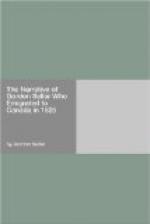round these that caused us to lose our way I cannot
say, but after a long walk we failed to sight the
pond. We made a fresh start and tried another
direction without success. ‘We are lost,
for sure,’ exclaimed Allan. Putting his
hands to his mouth he let out a yell that startled
the crows from a tree-top. We listened, there
was no answering sound. Then he whistled long
and sharp. Again no answer. Jabez had pointed
out to me that the north could always be known by
more moss growing on that side of trees, and I decided
we had been travelling in that direction. If we
could have got a glimpse of the sun we would have
known for sure the points of the compass, but the
foliage of the tree-tops prevented a ray getting through.
We walked smartly, as we thought southwards, when Allan
again yelled with all his might. Strange to say,
an hillo came from the woods on our left and quite
close to us. We hurried in the direction of the
sound and came out on a small clearance with a shanty
in the middle. A well-made young fellow stood
at the door. ‘Lost your bearings, eh?’
he asked. ‘Yes,’ answered Allan,
‘and glad you heard my yell.’ He led
us into the shanty; the table was spread for supper
and a man and woman were seated ready to begin ’These
two fellows are Scotties, new-come out, and got wandered,’
was our introduction. Responding to a hearty
invitation, seats were found and we helped to dispose
of the dried venison and bread that was on the board.
’Did you ever taste coffee like that?’
asked the woman as Allan passed in his tin for a second
supply. ’That is bush-coffee and better
than the storestuff. It is made from dandelion
roots and I will tell your folk how to make it.’
They were Americans and had led a wandering life,
for the father was a trapper. Game becoming scarce
from growing settlement on the American side he had
crossed into Canada and had spent the last two winters
round lake Simcoe. ‘There is no hunting
after February’ he said, ’for every critter
then begins nursing and the fur is not worth paying
for, so we came south and took this shanty, setting
to work to make axhelves and shingles, there being
ready sale in Toronto. We move back to the lakes
in the Fall.’ I asked him about the shanty.
He replied that it was not his nor did he know whose
it was. ’Like enough some poor emigrant
drew the lot and after breaking his back with hard
work in making a clearance, found he could not pay
the price and just lit out. You will find deserted
shanties everywhere in the bush left by families who
lost heart.’ He showed much interest in
our coming and we had difficulty in getting him to
recognize our location. It was not until I mentioned
the pond that he recognized the spot. ’Why,
you aint much over a mile to go.’ When
we were about to start the whole family got ready to
go with us. ‘The sun won’t set for
an hour yet, and there is good moonlight,’ said
Simmins, for that he told us was his name. ’Did
you never get lost?’ I asked. ’That




